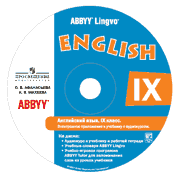Each student - in the dictionary Lingvo

Information technologies are increasingly penetrating various fields of education. Our company is also involved in this positive process. Already since November of last year, Russian schoolchildren can use the ABBYY Lingvo dictionary and the Tutor tutorial along with the English textbooks of the publishing house Enlightenment - they are now supplied with CDs with our programs.
Lingvo compiles three lines of textbooks, each from Grade 2 to Grade 11: two “classic” authors, V.P. Kuzovlev et al. And O.V. Afanasieva, I.V. Mikheeva and the new one, which was called “English in Focus” (“Spotlight”). This series was created by "Enlightenment" together with foreign partners and is the best series of textbooks written in Western style.
For the project, two special versions of Lingvo have been developed: for grades 2-4 and 5-11, the program includes school dictionaries of the publishing house Russian Language. Media ”(one of the best on the Russian market) and the English-Russian grammar dictionary Lingvo Grammar. For each textbook, a separate distribution will be produced in which vocabulary from textbooks divided into lessons or sections will be added to the Tutor dictionaries (the program has been specially modified) - after the end of each lesson, students will be able to learn exactly the words they have just met.
')
By the way, the use of information technologies in education is due to quite objective reasons - they help to increase the efficiency of training several times. The study of the effectiveness of IT in the study of foreign languages is actively conducted around the world. Recently, we came into the hands of an interesting study conducted at Adam Mickiewicz University in Poland.

The table shows the results of one of these studies: a group of 64 students who study English at the intermediate and advanced levels was divided into two parts, each of which received the same tasks for developing productive and receptive foreign language skills. Only one part worked with the paper dictionary (Collins Advanced Learners' dictionary), and the other with the electronic version of the same dictionary. The results of the exercises we see in the line “Proper proper”: 92.0 and 92.2% of the correct performance of the exercises in the group, which used the paper dictionary and 98.7 and 98.5% in the group, which used the electronic dictionary.
After a few weeks, the experiment was repeated once more. The groups were given the same tasks again, but in a different sequence, so that the students did not remember where they needed to put the answer and this time they did not give the dictionary. The purpose of the retest was to check the memorability of words. The results of the re-experiment are visible in the Retention test column. The group that worked with the paper dictionary showed the results of 62.4 and 45.7%, the group that worked in the electronic dictionary showed the results of 76.7 and 63.8%.
Source: https://habr.com/ru/post/111854/
All Articles